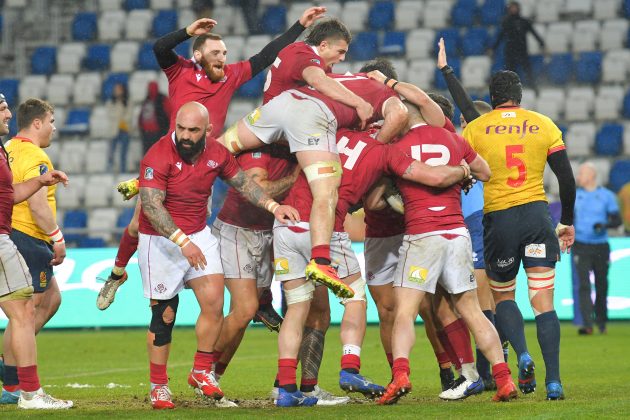The Rugby Europe Championship enters a new era, as the competition changes format, but Georgia remain favourites
A New Year, a new life. That’s the old saying. And 2023 will mark a new beginning for the Rugby Europe Championship – the Test competition below the Six Nations – as the contest is set for a revamped format that seeks to generate more engagement and attention from the public.
Until last season, the competition was played in a round-robin format between six nations, with the likes of Georgia, Spain, Portugal, Romania, Netherlands, and Russia (now ejected due to the ongoing conflict in Ukraine) duelling not only to reach the gold but also for qualifying points for the Rugby World Cup.
With Russia gone, Rugby Europe has promoted a trio of new contenders to the main division, as Belgium, Poland, and Germany now join the other five to complete a set of eight challengers.
The new Rugby Europe Championship format
So how is it going to work, starting this season?
- The eight contestants are sorted into two groups of four, with Georgia (champions), Spain (4th seed), Netherlands (5th), and Germany (8th) sharing a pool. Romania (2nd), Portugal (3rd), Belgium (6th) and Poland (7th) will play between themselves in the other pool.
- The top two teams of each pool qualify for the Championship semi-finals, and the bottom four will play in an elimination round to determine the final standings.
- Each team will play five matches.
- Each new season there’s a reshuffle of the pools, as the standings will decide who plays against whom.
Apart from the pool stage, the knock-out phase is the major change, applying a kind-of crescendo to the European competition, following the same recipe as in the youth competitions (all played in brackets).
Will Georgia rugby dominate again?
So, now the big question: Will Georgia dominate this modified championship too? The change of format shouldn’t disrupt the favouritism that the Lelos have enjoyed throughout the years. They start in pole position for 2023, followed by Romania, Portugal, and Spain, who have tried to steal gold from the Georgians in the last couple of years.
⏳ Almost time for another Rugby Europe Championship… ? pic.twitter.com/6UgmEq0Ndv
— Rugby Europe (@rugby_europe) January 13, 2023
Georgia have won 11 of the last 12 editions of the Rugby Europe Championship – Romania were able to win it in 2017 in a memorable final played in Bucharest – and they are a behemoth in the European competition. More impressively, their last defeat was in 2017, proof of total domination and control.
Since Levan Maisashvili was chosen as Georgia head coach, he has guided the Lelos to three Rugby Europe Championship titles and coached the Black Lion franchise to two Super Cup trophies (Rugby Europe’s franchise competition). Georgia also revelled in historic wins against Italy and Wales, under Maisashvili’s leadership.
With both Romania and Portugal having qualified for the Rugby World Cup 2023, it will certainly be interesting to see if any of the two can scratch Georgia’s record, and claim a trophy they held for the last time in 2017 and 2004, respectively.
As for the Leones of Spain, they enter what seems to be a new era – Santiago Santos remains as head coach but there are a couple of big changes in the squad.
Netherlands will want to show there was an improvement in the last two years, and their main focus will be to finish above the new entrants. As for Belgium (head coach Mike Ford will be assisted by former England international Mouritz Botha), Poland and Germany, it will be a new challenge, one they want to take on, even if they are right up against it in this first season.
Very pleased to have join Belgium Rugby’s coaching staff. Looking forward to an exciting challenge. pic.twitter.com/xbckw12jvX
— Mouritz Botha (@mouritzbotha) January 18, 2023
When does the Rugby Europe Championship start?
The Rugby Europe Championship 2023 starts February 4, and the pool stage will play out over the following two weekends, with the knock-out phase taking centre stage in March. Rugby Europe will broadcast the whole competition, and you can follow it on their website.
Players to watch in the Rugby Europe Championship
For the casual fan who wants to dip a toe in the Rugby Europe waters, these are our four players to watch closely:
- Davit Niniashvili
(Lyon|Georgia|Wing/Full-back)
a purely magical player who has conquered the hearts of anyone who fancies attacking rugby. He will run. - Dragoș Ser
(Steaua București|Romania|back-row)
the powerful flanker will be a future leader of the Romanian pack, be it through his breakdown abilities or tackling prowess. - Kerman Aurrekoetxea
(Biarritz | Spain | Scrum-half)
Sniper passing skills and an electric tempo, Kerman Aurrekoetxea is a man who can enchant the crowds. - Rodrigo Marta
(Dax|Portugal|Wing/Centre)
The speedster is on the run to become a Portuguese legend, thanks to his pace, handling skills, and showstopper momentum.
What do you expect from this tournament? Let us know on social media or via rugbyworldletters@futurenet.com
Download the digital edition of Rugby World straight to your tablet or subscribe to the print edition to get the magazine delivered to your door.
Follow Rugby World on Facebook, Instagram and Twitter.





